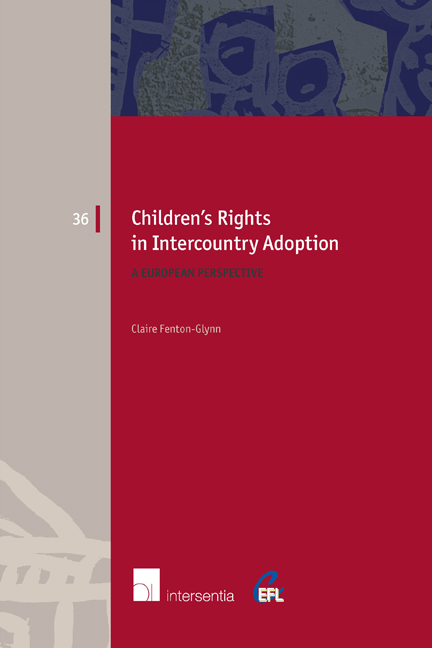Book contents
- Frontmatter
- Dedication
- Acknowledgements
- Contents
- Table of Cases
- Chapter 1 Introduction
- Chapter 2 Combating Abuses: International and Regional Regulation
- Chapter 3 Intercountry Adoption and the Domestic Child Welfare System: The Principle of Subsidiarity
- Chapter 4 Consenting Adults: Giving and Receiving Consent to Adoption
- Chapter 5 Buying Babies: The Inducement of Consent
- Chapter 6 Compulsory Adoption: Adoption Without Consent
- Chapter 7 Child Participation: Autonomy and Protection
- Chapter 8 Adoptive Parents: Eligibility, Preparation, and Support
- Chapter 9 Who Am I? The Child's Right to Identity
- Chapter 10 Conclusion
- List of Legislation
- Literature
- Index
- About the Author
- Miscellaneous Endmatter
Chapter 2 - Combating Abuses: International and Regional Regulation
Published online by Cambridge University Press: 26 November 2017
- Frontmatter
- Dedication
- Acknowledgements
- Contents
- Table of Cases
- Chapter 1 Introduction
- Chapter 2 Combating Abuses: International and Regional Regulation
- Chapter 3 Intercountry Adoption and the Domestic Child Welfare System: The Principle of Subsidiarity
- Chapter 4 Consenting Adults: Giving and Receiving Consent to Adoption
- Chapter 5 Buying Babies: The Inducement of Consent
- Chapter 6 Compulsory Adoption: Adoption Without Consent
- Chapter 7 Child Participation: Autonomy and Protection
- Chapter 8 Adoptive Parents: Eligibility, Preparation, and Support
- Chapter 9 Who Am I? The Child's Right to Identity
- Chapter 10 Conclusion
- List of Legislation
- Literature
- Index
- About the Author
- Miscellaneous Endmatter
Summary
International adoption worldwide is governed primarily by two international instruments: the United Nations Convention on the Rights of the Child, which has been ratified by all European states; and the Hague Convention on Intercountry Adoption, which has been ratified by all but three. In addition to these international instruments, the Revised European Convention on the Adoption of Children of 2008 (ECA 2008) provides a regional mechanism for regulating the practice. Although this Convention has fewer signatories than the international instruments, its regional nature and the specificity of its provisions make it an important element of the legal regime. These instruments will provide the core for the analysis of state practice in this book, and for developing normative guidelines for the protection of children's rights in intercountry adoption.
Although the European Convention on Human Rights will play a central role in this book, its provisions will not be used as a basis for analysing state practice. Instead, the decisions of the ECtHR themselves will be examined for compliance with the rights of the child as contained in the instruments above, focusing in particular on whether they promote children's rights in this area, or rather undermine the international human rights principles.
The reason for treating the ECHR differently from these other international and regional instruments is two-fold. First, and most importantly, the Convention is not a children's rights instrument. As Eekelaar and Dingwall argue, the structure of the ECHR suggests that “the minds of the drafters were not directed at the child within the family, but on the relationship between the adult members and the outside world.” Children and minors are only mentioned twice in the main body of the Convention: under article 5(1)(d) (the right to liberty and security) an exception to the right is permitted where a minor is detained for the purpose of educational supervision or for bringing him or her before a legal authority; and under article 6(1) (the right to a fair trial) which allows for the exclusion of the press or public from a trial where the interests of a juvenile require. Both these articles thus provide exceptions to general rights for adults in order to provide additional protection for children in the area of juvenile justice, rather than providing children with rights that they can enforce against the state.
- Type
- Chapter
- Information
- Children's Rights in Intercountry AdoptionA European Perspective, pp. 11 - 20Publisher: IntersentiaPrint publication year: 2014



